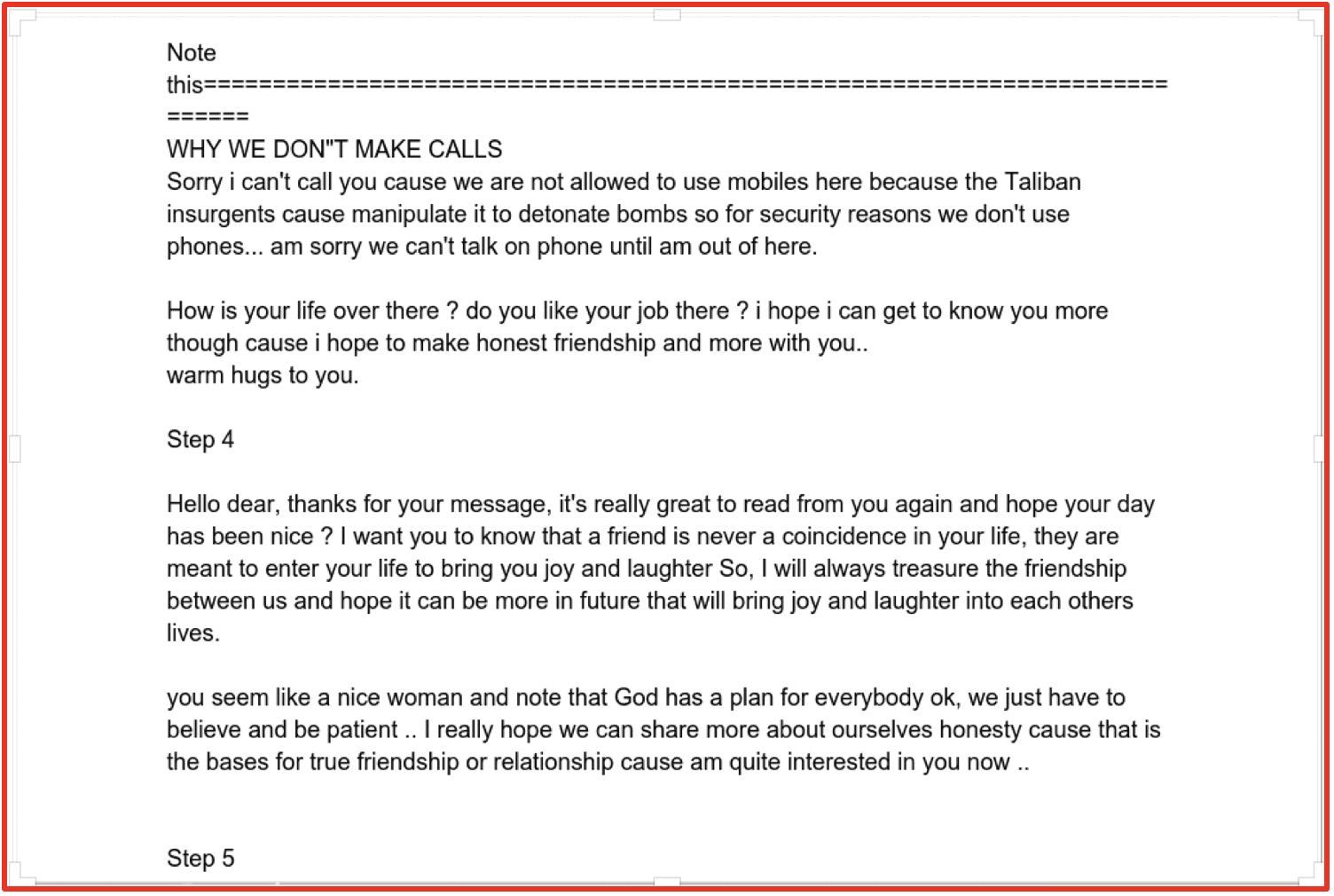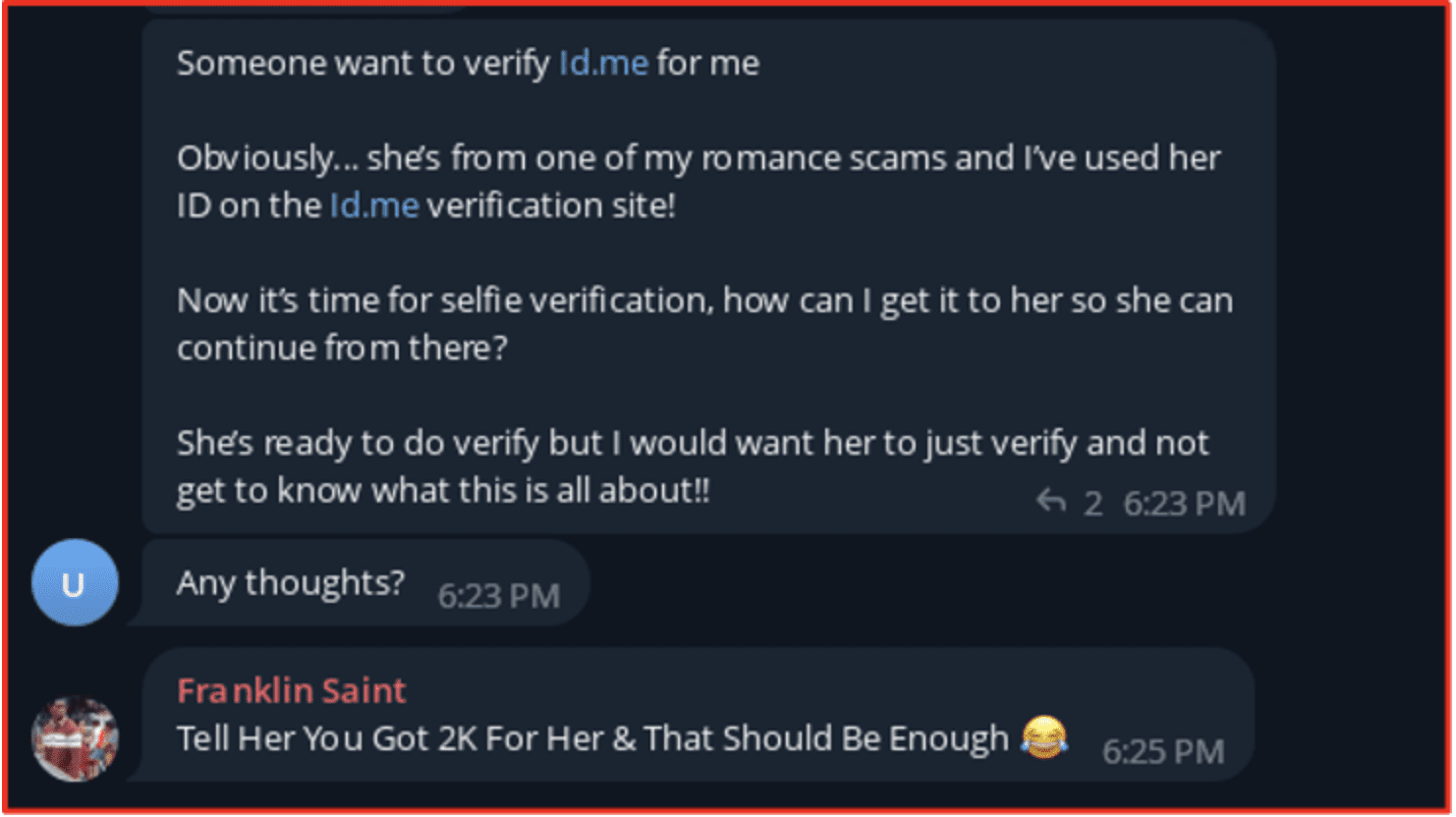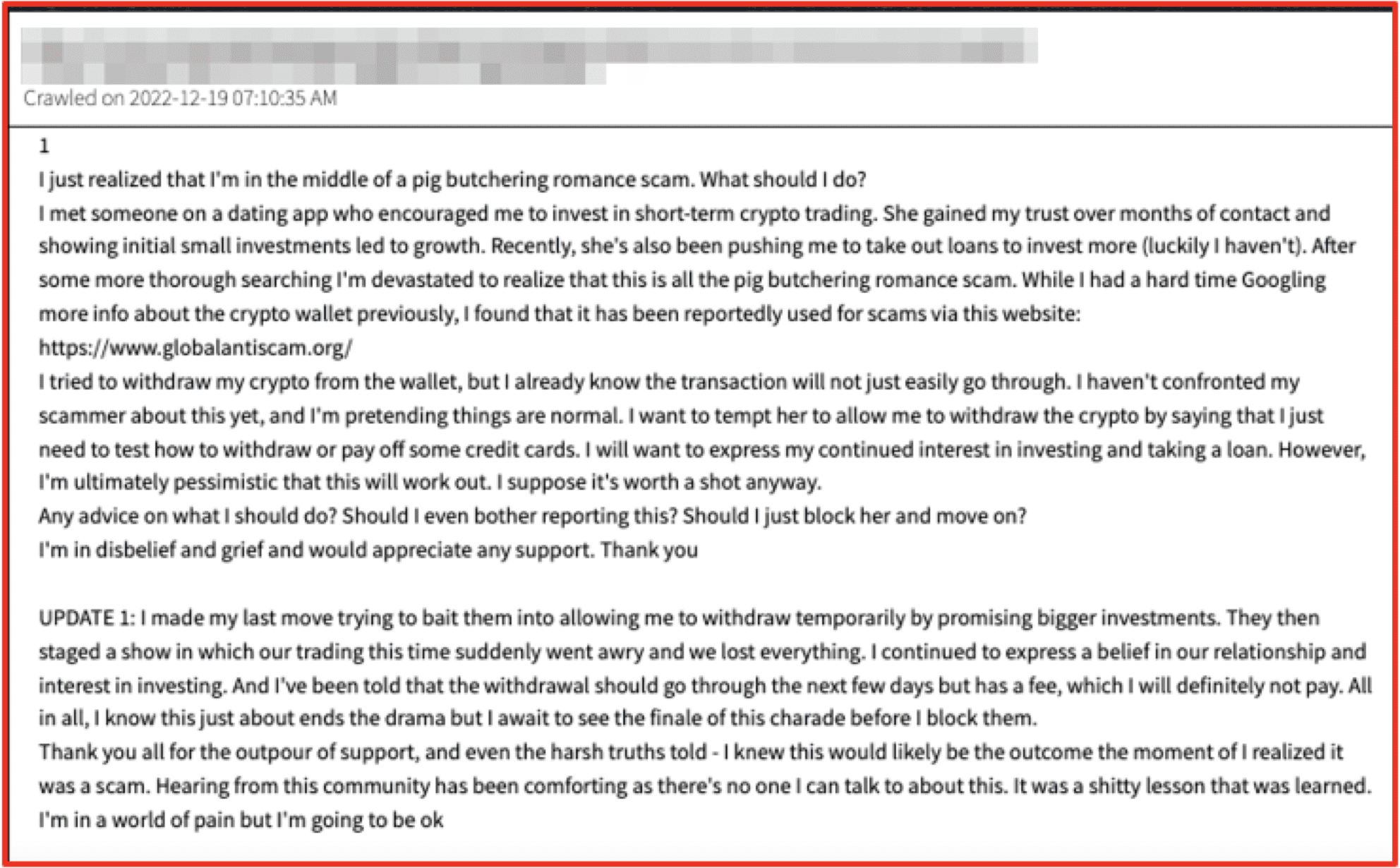Romance Scams on the Darknet
February 14, 2023
In light of this year’s Valentine’s Day, our analysts put together a piece to shed light on romance scams – one of the fastest growing schemes across the globe. For a quick reference guide to terms we use throughout the piece, scroll to the end of the blog or go their directly here.
Romance Scams Have Been Quietly Gaining in Popularity
In the last decade, dating apps and websites have skyrocketed in popularity. As a result, nefarious actors have similarly sought to capitalize off of this booming industry by exploiting and scamming its users. In fact, according to the Federal Trade Commission (FTC), the number of reported romance scams tripled in size from 2017 to 2021.
Public education around this costly scheme appears to have helped temper some of its detrimental effects. In 2022, there was a 10% drop in the number of people who fell victim to romance scams. However, in the same year, reported monetary losses surpassed $1 billion USD.
This data could indicate that while scammers are scamming fewer people, they are using targeted methods to scam more money from fewer victims. If scammers are able to make $100 a day, or $2,000 per month – as advertised on darknet marketplaces and forums – romance scamming will likely continue because it is clearly a profitable practice. For context, the average salaried worker on a $40k per year salary makes approximately $153.84 per day before taxes. As long as the romance scam industry is profitable, the darknet will continue to innovate.
Considering the surge in identity theft and fraud worldwide, it is critical to monitor the darknet for strategic awareness of the methods and deception techniques used on victims, especially as they evolve. Romance scams can have multiple layers of victimization, both financially and emotionally. While financial losses have obvious repercussions, many victims report the heartbreak and shame to be even more traumatizing.
“But even though I lost all of my money, everything that I had, the worst part was losing the love and the life that I thought I was going to have with him and the kids.” – WMar2 News
What is a Romance Scam?
The FBI’s Internet Crime Complaint Center asserts that romance scams are also known as confidence fraud or online dating scams.
In a romance scam the victim is tricked by an online scammer into believing that they are in very real, serious, romantic relationship. The scammer’s goal is to defraud the victim and take as much money as they can coerce them to give. Scammers use fake identities and win over their victims’ trust and hearts. Scammers persuade or blackmail victims for money or attempt identity theft with the victim’s personal information. This type of scam is referred to the ‘long game’ and can take place over several years.
Romance scams have very specific characteristics. Scammers often approach their target on a traditional online dating platform and will try to move the conversation quickly from the dating site to a direct one-to-one chatting platform. Things often move very fast; they are quick to declare their love, propose, and use other love bombing tactics. Usually, their profile picture and their story will seem too good to be true – they live far away (e.g. from another country or deployed), and will not video chat in person.
Typically, a romance scammer will start out by asking for small amounts of money. They will continue asking for money by inventing stories with urgency – such as claiming that a catastrophe has struck, or that their small child is in the hospital. Ultimately, the scammer will find the victim’s vulnerabilities and emotional weaknesses and exploit them as much as possible.
Romance scams occur across multiple apps and online sites and are not limited to online dating applications. However, online dating sites are a popular platform targeted by romance scammers. Victims could be baited by a romance scammer on social media such as Facebook, Instagram, Snapchat, TikTok, or gaming apps like Words With Friends.
Romance Scams Live at the Intersection of Multiple Deceitful Environments
Identity Theft
Romance scams live at the intersection of multiple forms of exploitation – though they more often lead to fraud than love affairs. One example of fraud resulting from romance scams is identity theft, where the scammer steals the victim’s personal information and uses the victim’s social security number, mailing address or other PII to impersonate them. This can lead to the actor opening lines of credit in their name, or even file false tax returns using the victim’s identity.
The scammer could also exploit the identity of a different innocent person by imitating them and using their photos and information to pose as the fictious online partner. Such is the case of Bryan Denny, a retired US army colonel whose likeness and image have been stolen thousands of times and used to create fake Facebook and social media accounts to scam victims. He is regularly contacted by women to see if he is the ‘lover’ they have been in a relationship with and who they sent money to. Today he is retired and a founding member of the group: Advocating Against Romance Scammers (AARS).
There is significant risk for the victims whose pictures and identities have been stolen for use in scams. They themselves could targeted by the upset victims of the actual scammer and threatened or harmed in retaliation.
Like identity theft, catfishing and eWhoring are prevalent in the romance scam space. Both practices involve stealing personal information from a victim to assume their identity and using that fake profile to scam and exploit others. eWhoring and catfishing with romance scams combine scams, identity theft (a type of fraud), and exploitation.
Money Laundering
Romance scams are sometimes leveraged to trick victims into unknowingly becoming money mules. Money mule schemes advertised as legitimate job opportunities are often scams. This can include opening bank accounts and processing wire transfers on behalf of another. These measures hide the criminal organization and make it more difficult for law enforcement to track them down. Despite their unawareness that they are a money mule, these victims are not protected by anti-fraud laws and can be prosecuted by law enforcement and imprisoned.
In a recent document collected in DarkOwl Vision, a threat actor describes how they target grandmothers via romance scams to “clean” or launder their illegally earned money. They described convincing an elderly woman who is a victim of a romance scam to take illegally earned money to a Bitcoin ATM so that it will go into the criminals Bitcoin wallet. According to the FBI and other cyber-specific law enforcement teams, money mules complicate tracing virtual and physical financial transactions.

Figure 1: Using romance scams for money laundering, Source: DarkOwl Vision
Trafficking and Illicit Markets
Romance scams sometimes use recruitment mechanism to coerce victims into other illicit markets and exploitation, including human trafficking, sex trafficking, and other illegal markets. The example pictured below, gathered from a DarkOwl Vision document, details such an an advertisement.

Figure 2: “beautiful scam white Caucasian girls…They can do Nudes, pics, videos, if you have certain things you like she will preform.” Source: DarkOwl Vision
Further searches in DarkOwl Vision found a user using this same name posting that they are “searching for young good looking women over eighteen who wants to earn a little extra for pleasures and pocket money,” and advertising free child pornography content and other pornography videos. While there is not definitive evidence this user is associated with sex trafficking, it is highly probably the potential overlap in exploitative markets exists.
There has been additional open source reporting to support this claim. Late last year, ProPublica reported human trafficking overlaps with romance scams, and that many romance scammers are victims of human trafficking forced into being romance scammers against their will. Per their research, the perpetrators of this type of scam are in some way recruited as victims themselves. Demographically, they are typically nationals from Southeast Asian countries who have been lured by promises of lucrative new jobs in a different country. Then, after traveling to the country for their new job opportunity, they are taken to areas of the country where corruption is rampant, gangs run human trafficking, and the government authorities are largely complacent.
These individuals are then usually trained and forced to be romance scammers – under strict surveillance and threats of violence. The workers are told that they must continue these operations to buy their freedom; however, buying their freedom is nearly impossible since many are already poor and the scamming jobs are designed so that they will never earn enough to leave.
Build a Relationship; Stick to the Script
During the course of this research, we generally found that romance scammers typically use pre-built scripts to carry out their schemes. The scripts instruct scammers how to befriend a victim, develop a believable romantic relationship, and earn money. As many romance scammers are often overseas and most of the victims are native English-speakers, the scripts try to account for all types of questions that could come up in conversation.

Figure 3: Example of a Script, Source: Social Catfish
Scams on Darknet and Darknet-Adjacent Sites
Discussion around romance scams and the communities involved, including both victims and scammers, can be found on the darknet as well as darknet-adjacent sites. Per the examples pictured below, DarkOwl analysts discovered multiple Telegram channels where users are seeking advice on romance scams from others in the community.

Figure 4: Source: Telegram, Channel Redacted

Figure 5: Source: Telegram, Channel Redacted
Over the course of their research, DarkOwl analysts observed that romance scams are rarely called ‘romance scams’ directly, but are often advertised and discussed as “catfishing” or “eWhoring”.
Most people are familiar with Catfishing – i.e. issuing stolen or fictitious information to create a fake identity and utilize that fake identity to trick others. On the other hand, eWhoring entails the theft or leaking of intimate photos, usually of women, which are sold on the darknet in “packs” and used to catfish victims. eWhoring is “revenge porn mixed with catfishing,” per Jess Davies, who added that “it’s happening thousands of women every single day, all around the world. They’re being traded like a card game, either for new packs, or money.”

Figure 6: e-Whoring packs available, Source: Tor Anonymous Browser
DarkOwl analysts found eWhoring methods, guides, and related materials posted in social engineering forums, general discussions sections, and listed as products for sale, on numerous darknet marketplaces and forums.
Hundreds of “packs” of women’s photos from OnlyFans are available for sale as well as what are advertised as leaked private photos. eWhoring guides can be purchased on the darknet although some of them are offered for free.

Figure 7: Free eWhoring guide, Source: Tor Anonymous Browser
DarkOwl analysts have also observed other products to assist with romance scams and eWhoring for sale on the darknet. This includes a “voice verification chat pack” offering to create custom voice messages.

Figure 8: Voice Verification Pack, Source: Breached Forums
Listings from darknet sites and DarkOwl Vision promise $8000 with eWhoring, or “PRIVATE EWHORING STRATEGIES | AT LEAST $100 A DAY” and a guide on a darknet site claimed users could make $2,000 a month.
Darknet and darknet-adjacent sites also serve as platforms for victims to ask if they have been a victim of a romance scam, get advice on what they should do, and share their stories to warn others.
In one DarkOwl Vision search result, a user on a darknet site writes a post about their realization they have been victimized by a romance scam. This user describes how the scammer gained their trust, and how they pushed them to take out investments. I an attempt to extricate themselves from this situation, the user reports trying to withdraw the crypto they had deposited without letting the scammer’s knowledge.
While this individual tried their best to convince the scammer to let them withdraw their money by promising bigger investments, the scammer staged a situation where the trading didn’t work and all the victims money was lost.

Figure 9: Source: DarkOwl Vision

Figure 10: Source: DarkOwl Vision
Final Thoughts on Romance Scams
Romance scams are part of a complex criminal enterprise that exploits unassuming individuals on both an emotional and sometimes devastatingly catastrophic monetary basis.
Per our analysts research, there is an overlap in the demographic of people who engage in these types of scams on the surface web and who also actively use the darknet. The darknet and darknet-adjacent sites are where victims can go to get help and where a scammer can buy tools and guides to scam more effectively.
For these reasons, the darknet is a potential source to monitor her activity to help combat romance scams and help slimy the current pace with which they’re currently proliferating. Or, said differently, the darknet can teach the next generation of scammers to be even more sophisticated while educating the next potential victims what to look out for and how to protect themselves.
Wondering how darknet data applies to your business? We want to show you! Contact us.
Quick Definitions:
Fraud: an umbrella term, legally referring to various types of chargeable criminal offenses. Fraud is serious criminal business, while scams are considered more minor offenses in comparison. Fraud can be thought of as a felony. Scams can be thought of as a misdemeanor.
Scams: particular segment of fraud. Scams are theft of funds with your permission or knowledge while fraud is financial theft without your permission or knowledge.
Romance scam: social deception designed for financial gain; however, because the victim willingly gives money, romance scams are not tagged as fraud; fall under social media scams.
Catfishing: using stolen or false information to create a fake identity trick someone into giving them information or money.
eWhoring: specific type of social engineering where the offender imitates a virtual partner in a romance scam or virtual sexual encounter. Victims are asked for money in exchange for more image content or are duped into a romance scam. eWhoring packs are sold on darknet marketplaces and forums consisting of leaked or stolen intimate pictures or stolen content resold from adult sites such as OnlyFans.
Social Engineering: process of psychologically manipulating people to get them to do things or share secret information.
For a full list of darknet terms, check out our Glossary.
Explore the Products
See why DarkOwl is the Leader in Darknet Data
Products
Services
Use Cases















